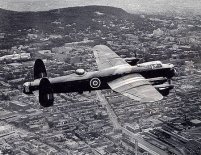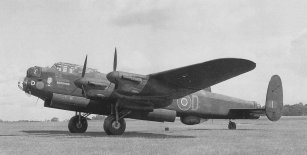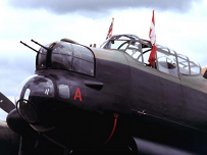
Avro Lancaster
The Avro Lancaster won immortality with the "Dambusters'. Royal Air Force No. 617 Squadron, under Wing Commander Guy Gibson, used the new bomber for their 21 March 1943 low-level attacks on German dams using drum-like 4196-kg(9,230-lb.) bombs designed by Sir Barnes Wallis.
But the Lancaster was much more than a one-mission wonder. Developed from the unsatisfactory twin-engined Avro Manchester, it was one of the few warplanes in history to be 'right' from the start. It was so well-designed that only minor changes were made as production surged ahead through World War II. While Flying Fortresses and Liberators pounded Hitler's 'Fortress Europe' during the day, the Lancaster ruled the night. It was vulnerable to German fighters from below, but it was also fast and heavily armed, and it usually got through to the target.
The Lancaster served well in post-war years, sometimes in civil duties. The final military user was Canada. Today, the Royal Air Force still maintains one flying Lancaster, alongside Spitfires and Hurricanes, in the Battle of Britain Memorial Flight.
The Avro Lancaster was Britain's greatest bomber of World War II providing the backbone of the RAF's night assault on Germany. This four-engined heavy bomber carried and delivered a bigger bombload than any other bomber in the European theatre. From its first minelaying mission in 1942 to its final bombing sortie of 1945, the 'Lanc' was a formidable fighting machine. One aircraft even survived 140 combat missions over Germany.
It was one of the most spectacular missions of World War II. By the dead of night, RAF bombers mounted an attack on the Ruhr dams, whose associated power stations served Germany's greatest industrial complex. Smashing the Mohne and Sorpe Dams with the revolutionary bouncing bomb, designed by Sir Barnes Wallis, the chosen crews of No. 617 Squadron performed a low-level night attack of unbelieveable precision. But although it disrupted German war production for some months, the raid had little permanent effect, and it cost the lives of 56 of the cream of British and Commonwealth aircrew.
 |
 |
 |
| An electronic warfare Lancaster drops metal strips knowns as 'Window' to jam German radar. |
The Lancaster was not just a night-bomber. One of the first Lancaster missions was a daylight raid on the MAN works at Augsburg, flown at low level. |
The Avro Lancaster on display at the RAF museum at Hendon near London flew 137 combat missions over Europe. |
|
Avro Lancaster (Technical Specification) |
| Role |
Seven-seat heavy bomber |
| Manufacturer |
Avro |
| Maximum Speed |
462 kmh (286 mph) |
| Maximum Range |
2,700 km (1,674 miles) |
| Ceiling |
7,467 meters (24,492 feet) |
Weight
Empty
Maximum Takeoff |
16,783 kg (36,923 lbs)
30,845 kg (67,859 lbs) |
Dimensions
Wingspan
Length
Height
Wing Area |
31.09 meters (102 ft)
21.18 meters (69 ft)
6.25 meters (20 ft)
120.49 square meters (1,296 sq ft) |
| Engines |
Four Merlin 24 inverted inline piston engines each providing 1223-kW (1,750 hp) |
| Armament |
Nine 7.7mm (.303 cal.)
Browning machine-guns plus up to 6,350 kg (14,000 lbs) of bombs |
Photo Gallery
Click here to submit your photo
| Have A Passion For Aircraft? |
Subscribe to our 14 series FREE newsletter
delivered weekly on World War 2 Aircraft factfile... |
| NB:- We hate spam as much as you do, so your email address will NEVER be shared with or sold to anyone else. That's a Guarantee. |
|
|











